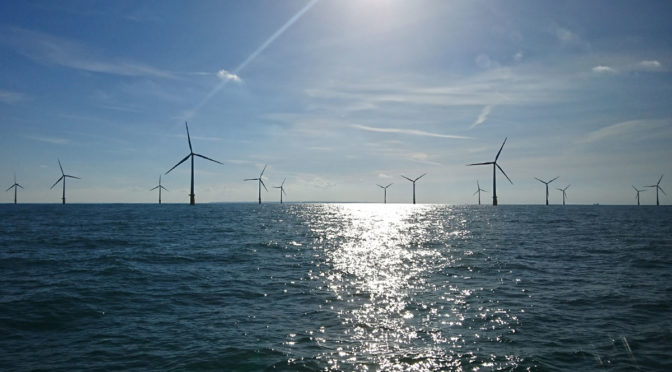Statoil and partners Masdar and Statkraft officially open the Dudgeon offshore wind farm in Great Yarmouth today (November 22nd). Since the investment decision was made in 2014, construction costs have been reduced by more than 15%, from GBP 1.5 billion to approximately GBP 1.25 billion.
All 67 turbines at the 402MW Dudgeon offshore wind farm are now delivering electricity to the UK grid, providing renewable energy to around 410,000 homes.
“Dudgeon represents an important contribution to realizing the UK’s renewable energy strategy. The UK has already achieved impressive reductions in CO2-emissions with clear policies to phase out coal, and last year achieved the lowest CO2 emissions since before year 1900. Statoil is proud to contribute to this both by being a large supplier of natural gas and by our investments in offshore wind,” says Statoil’s CEO Eldar Sætre.
“As part of our strategy to develop from an oil and gas company to a broad energy major, Statoil will grow significantly in profitable renewable energy, with an ambition to invest around NOK 100 billion towards 2030. Dudgeon has successfully been developed in cooperation with Masdar and Statkraft, and is a key part of Statoil’s strategy to complement our oil and gas portfolio with profitable renewable energy solutions, as well as adding to Statoil’s strong UK presence,” says Sætre.
Dudgeon is located 40 kilometers off the coast of Norfolk in England. Local suppliers account for more than 40% of the value creation in the Dudgeon project.
“Today marks the completion of a three-year journey to deliver our third wind power project in the United Kingdom, but only the latest step in our collaboration with Statoil and Statkraft. We’re proud to have played a significant role in the delivery of Dudgeon, both on the operations side and in terms of financing. The teamwork among our three companies has been exceptional, a key factor in the successful delivery of this flagship wind energy project,” says Mohamed Al Ramahi, CEO of Masdar.
“The way that the Dudgeon project has been delivered embodies the strengths and culture of the companies involved, Statoil, Masdar and Statkraft. It has required significant technical innovation, has been delivered through an excellent relationship with local stakeholders and suppliers and has stimulated local jobs and economic growth for the East Anglia region. And the project itself has been delivered on time, below budget, and most importantly with an excellent safety record,” says Statkraft’s President and CEO Christian Rynning-Tønnesen.
As operator of both the Sheringham Shoal and Dudgeon offshore wind farms, located in the same area, Statoil’s priority is to improve efficiency further and increase collaboration between projects.
“Over recent years Statoil has worked hard to reduce costs, improve efficiency and increase profitability in both our oil and gas projects and our renewable projects. Reducing costs by more than 15%, or GBP 250 million, at Dudgeon and completing the construction phase without any serious incidents is a great achievement by all three partners,” says Statoil’s executive vice president for Technology, projects and drilling, Margareth Øvrum.
Towards 2030 it is estimated that the installed capacity of offshore wind in Europe can grow from 12GW (2016) to 70 GW. Improved technology, increased deployment and lower costs are the key drivers turning offshore wind into an attractive power source, outcompeting traditional sources of energy in important markets.
Statoil already has a sizeable renewables portfolio. Its current offshore wind portfolio has the capacity to provide more than 1 million homes with renewable energy. This includes the Sheringham Shoal wind farm in the UK, the Arkona offshore wind farm in Germany and Hywind Scotland, the world’s first floating offshore wind farm, which came into production in October. The operations center and maintenance base for the Dudgeon offshore wind farm is located in Great Yarmouth.

